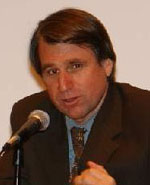2007年VOA标准英语-Muslims Skeptical of War on Terrorism(在线收听)
Washington, D.C.
10 May 2007
Several recent public opinion surveys have found that large majorities in most Muslim countries are hardening their views on the U.S.-led war on terrorism, which they say is endangering the security of the Islamic world.
 |
| Steven Kull of the University of Maryland |
According to a more recent survey by the University of Maryland, most people in Egypt, Pakistan, Morocco and Indonesia -- which account for about 300-million Muslims -- don't accept America's justification for the war on terrorism.
Instead of seeing it as strategy to fight those who pose a threat to the United States, 80 percent of the respondents say the U.S. wants to weaken and divide the Islamic world and about 64 percent say a U.S. goal is to spread Christianity throughout the region.
In short, Steven Kull, Director of the University of Maryland's Program on International Policy Attitudes, says large majorities across these countries fear the U.S. is at war with their faith.
"There is a clear feeling in this part of the world that Islam has been targeted as a whole and that ultimately there is a real desire to eliminate Islam,” says Kull. “We also asked, 'Is it America's goal to weaken Islam as a religion so that it will not grow and challenge the Western way of life?' Very large majorities agreed with that statement."
Support for Attacks on U.S. Forces
One of the goals of the survey, which was partly funded by the U.S. Department of Homeland Security, was to find out how much support anti-American terrorist groups, such as al-Qaida, have in those nations.
Most of the respondents said that they consider terrorism a serious challenge. The highest level of concern was in Pakistan where 83 percent said terrorism is a very big problem. Two-thirds of Indonesians said the same and 62 percent of Egyptians agreed.
Significant majorities in all four countries strongly reject violence against civilians, such as bombings and assassinations, says pollster Steven Kull.
"In the focus groups,” he adds, “people really wanted to say and said it passionately that Islam is not violent. Islam does not support attacks on civilians. Majorities in every country said that such attacks are not justified at all. We also asked whether attacks against civilians in conflict are effective. With the exception of Egypt, the most common answer is that they are hardly ever effective."
But at the same time, Kull notes, large majorities support attacks on U.S. troops and many support goals they attribute to al-Qaida -- standing up to America in defense of Muslims, removing U.S. forces from all Islamic countries and pushing the United States to stop favoring Israel in its dealings with the Palestinians.
Most pollsters agree that the Arab-Israeli conflict is the issue that matters most to Muslims around the world, especially in the Middle East.
Arab-Israeli Tensions
Shibley Telhami of the Brookings Institution has conducted several public opinion polls in the Middle East since 2003. He says a recent survey in Egypt, Jordan, Lebanon, Morocco, Saudi Arabia and the United Arab Emirates shows that the issue holds the key to restoring America's image and influence in the region.
"In the latest poll conducted in the six Arab countries, the question asked was: 'Which steps would improve your views of the U.S. most?' By far, the number one answer was brokering the Arab-Israeli peace based on the 1967 border. More than 60 percent said that is the single issue that would affect the views of the U.S. most, and the second was the withdrawal of U.S. forces from the Middle East," notes Telhami.
According to Christine Fair of the Center for Conflict Analysis and Prevention at the U.S. Institute of Peace the Israel-Palestinian conflict resonates as far as South Asia.
 |
| Christine Fair of the U.S. Institute of Peace |
Although surveys show that there is widespread support for strengthening the role of Islam in their societies, most Muslims disagree that violent conflict between the West and Islam is inevitable.
But some public opinion surveys show that many Muslims are open to Western values, such as religious freedom and democracy.
"Our polling has found Muslims consistently saying that Western-style democracy can work in their countries, and that's a good thing. And despite the fact it is very difficult for them to say good things about the United States, they do tell us that the United States supports democracy in their country," says Andrew Kohut, President of the Pew Research Center in Washington.
Kohut and other experts point out that the many surveys of Muslim attitudes conducted since the September 11, 2001 terrorist attacks on New York and Washington, provide in-depth knowledge of Islamic societies, and show that their concerns are heard in the United States.